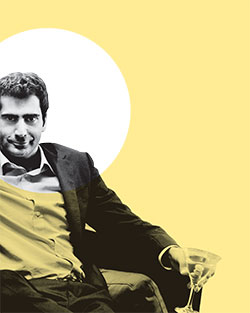 |
(Photo: Franco Pagetti/VII) |
Kerrisdale Capital
Founded: 2009
Assets under management: $250 million
Twitter followers: 1,925
Lesson: It pays to do your homework. It also pays to be a loudmouth.
“Oh, man, did you read the Burkle letter?”
Sahm Adrangi, the 32-year-old founder of Kerrisdale Capital, turns up the volume on his office speakerphone. “No, read it to me,” he says to the trader on the other line. The trader cackles. “I’ve never seen anything like it in twenty years. Okay, ready? Listen to this: ‘Stop acting like a spoiled child. Stop playing with the company as though it’s your new toy. Get Morgans on the market, and sell it to an appropriate buyer … Ask your mother to buy you something else.’ ”
Adrangi, an Iranian-born Canadian with two-day stubble and mussed, dark-brown hair, breaks into a giggle. The letter’s author, investor Ron Burkle, is a well-known Wall Street loudmouth who, for his latest act, has decided to torment the board of Morgans Hotel Group, which operates properties like the Hudson and Mondrian hotels. Burkle wants the company’s chairman, a young financial scion named Jason Kalisman, to sell Morgans. Kalisman won’t sell, so Burkle is trying to shame him into submission with a poison-pen letter. It’s a classic Wall Street proxy battle, and Adrangi—who owns 4.2 percent of Morgans—is on Burkle’s side.
“He’s just this, like, cocksucker,” Adrangi says of Kalisman. He leans back in his desk chair. His sleeves are rolled, and an inch of ankle peeks out from under his slacks. “He’s arrogant but with nothing to be arrogant about,” says Adrangi. “He went to Harvard, so he thinks he’s hot shit.”
Normally subdued, Adrangi is riled up about the Morgans situation, which he thinks is rewarding the stubborn board at the expense of shareholders. Before today, he’d been preparing his own letter that came to the same conclusions as Burkle’s, though with far less colorful language, but he hasn’t sent it yet, partly because he’s still getting the hang of this corporate-raiding thing.
“Maybe it’s time for us to go nuts,” Adrangi says to one of his employees, a Wharton-educated junior analyst. His voice cuts through the air of Kerrisdale’s office, a nondescript suite on the third floor of a midtown building. The area around his desk is littered with an empty Marlboro pack, a Curious George lunch box, and a Post-it note on his computer monitor reminding him never to buy Apple stock again.
“My inclination is we drop the letter today,” says the analyst. “I think now or never.”
Adrangi taps his foot under his desk and shakes his head. “Ehh, we can do it tomorrow. I think today is too quick. Plus, I’d like to get on CNBC for it.”
“The goal is to get people to do what we want them to do,” the analyst protests.
“I think it’s good from a PR perspective to go after these guys,” Adrangi says, flicking idly through his Facebook feed. “I just don’t know if it’s going to make us any money.”
This kind of restraint is getting harder for Adrangi, who made his name first as a short-seller, betting against what he believed to be fraudulent Chinese companies. He made his first millions when their stocks fell. The success attracted the attention of much bigger fish, and his bedroom operation turned into a $250 million fund. At an age when most of his peers are still doing lunch runs for their bosses, Adrangi is one of the most aggressive investors on Wall Street, a guy some hedge-fund observers expect to one day join brawlers like Carl Icahn, Daniel Loeb, and William Ackman in the big leagues. To keep that reputation, he’s been trying to build his notoriety by inserting himself into high-profile rumbles.
Adrangi, whose father owns a chain-link-fence company, is a fairly recent convert to dog-eat-dog capitalism. At Yale, he wrote columns for the campus newspaper that show his ideological evolution from lefty rabble-rouser (“When I first set foot on Old Campus, I couldn’t wait to stick it to the man and topple his evil capitalist empire”) to market-infatuated econ major (“Nowadays, I see trade as a cure to global poverty. I see sweatshops as a necessary evil.”). After graduation, he came close to taking a job at The Wall Street Journal but instead went to do investment banking at Deutsche Bank, followed by a few short stints at hedge funds. Then, in 2009, he struck out on his own, trading $300,000 of his and his parents’ money in a one-man shop he named after the Vancouver neighborhood where he grew up. At first, he worked out of his East Village apartment, which he shared with three friends. Eventually, he persuaded a hedge-fund recruiting firm to rent him an empty desk, where he would often show up in shorts and flip-flops before opening bell.

